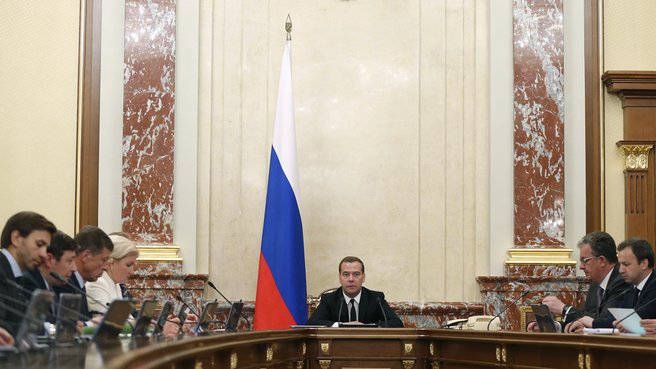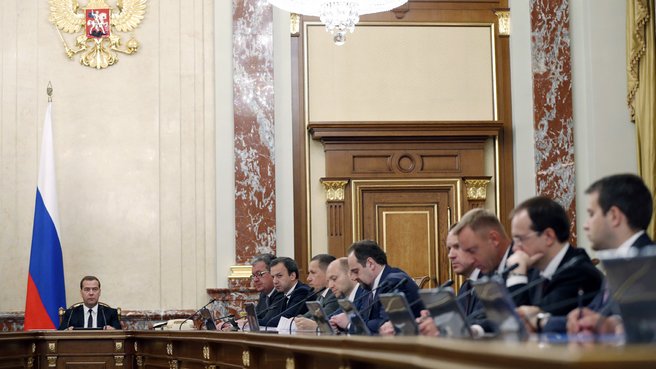The main item on the agenda: scenario provisions and chief parameters of the national socio-economic development forecast and maximum levels of prices (rates) for the services of companies in the infrastructure sector in 2015 and the 2016-2017 planning period.
Dmitry Medvedev’s introductory remarks:
Ladies and gentlemen, before we start discussing the agenda, I would like to introduce our new colleague, Lev Kuznetsov, who was put in charge of our new ministry – the Ministry of North Caucasus Affairs. In effect, we continue to establish administrative divisions functioning in line with the territorial principle and combining the departmental and territorial approach. This approach was tested and proved practical and expedient, and Mr Alexander Khloponin will continue to coordinate this sector at the Government level. Understandably, this sector is rather complicated. Challenging tasks regarding the social and economic development of the North Caucasus, the creation of jobs, and efforts to raise living standards and improve the quality of social infrastructure require purposeful and systemic work and the permanent attention of federal-level agencies. In effect, this, too, amounts to a federal priority.
I am confident that our colleagues will help the new executive agency to launch effective work. Mr Kuznetsov, I wish you every success.
And now, let’s start discussing the agenda.
Dmitry Medvedev: "A new budget cycle is starting, and we need to specify the projected basic macroeconomic indicators and draft a realistic and well-balanced budget for the next three years. Certainly, we must try and do this. All subsequent work to provide resources for state programmes regarding industrial development and that of the social sector will proceed in line with the foreign economic situation forecast, economic growth rates and projected investment activity."
The first item deals with the scenario provisions and parameters of the 2015-2017 national development forecast. A new budget cycle is starting, and we need to specify the projected basic macroeconomic indicators and draft a realistic and well-balanced budget for the next three years. Certainly, we must try and do this. All subsequent work to provide resources for state programmes regarding industrial development and that of the social sector will proceed in line with the foreign economic situation forecast, economic growth rates and projected investment activity.
Russian and foreign companies must receive clear guidelines regarding our economic policy and the Government’s measures to restrict inflation and stimulate investment, support industries, agriculture and the real sector of the economy. This helps to estimate risks and make competent decisions for business development. Prospective evaluations are especially important for those industries that require substantial government funding such as fuel and energy, transportation and construction.
Dmitry Medvedev: "The provisional forecast that we plan to rely on must be well-balanced in terms of macroeconomy and provide a margin of safety to ensure the unconditional fulfilment of social commitments, continue the modernisation of education and healthcare, the development of housing and utilities, resolve demography issues and act upon the documents we build our work on."
The provisional forecast that we plan to rely on must be well-balanced in terms of macroeconomy and provide a margin of safety to ensure the unconditional fulfilment of social commitments, continue the modernisation of education and healthcare, the development of housing and utilities, resolve demography issues and act upon the documents we build our work on – the May 2012 presidential executive orders and the Government Policy Priorities, even under rather complicated conditions. Another significant area – the social and economic development of Crimea – will also require additional efforts and costs. Soon, we will also start major investment projects in the Far East to create so-called areas of advanced development in the region. Such areas will be created not only in the Far East, but also in some other places because the bill which is in the making takes effect across the country. We cannot but consider those serious restrictions that Russia has faced recently. They include first of all a drop in investment and consumer demand, continuing capital drain and, let’s face it, not the most favourable situation in global financial markets and markets of Russian traditional exports. All of these factors must be assessed fairly, without excessive dramatising or euphoria, through cold and objective calculations. In particular, we must count on rather stable oil prices. I have just returned from the forum that addressed this issue.
Dmitry Medvedev: "The forecast that we’re discussing today should answer the main questions. What sources and resources will allow us to reach these figures? What budgetary and monetary measures should we take to encourage investment and private business, expand non-energy exports and make our products more competitive in world markets?"
I understand that the forecast is shared there. There are many energy ministers there from most diverse countries, including key players on the energy market. The global economic growth indicators are also a fairly good background. On the whole, the forecast is not bad, although we must be ready for other scenarios and have therefore drafted them as well. In other words, we should have an entire package of options. The minister will quote specific figures in his speech.
Considering current difficulties based on year results, we expect economic growth to be 0.5% under the basic scenario. Some forecasts are more optimistic but no more than that. In the future, we expect the GDP growth rates to increase to 2%-3% but this will also depend on many factors.
The forecast that we’re discussing today should answer the main questions. What sources and resources will allow us to reach these figures? What budgetary and monetary measures should we take to encourage investment and private business, expand non-energy exports and make our products more competitive in world markets?
Tariffs on the services of infrastructure companies are a separate issue. They influence the macro-economic situation and the results of the forecast. I hope that the minister will speak about all of this. Let me get right to the point – only time will tell which of these scenarios will work, and all the more so in the current conditions.
In any event, a lot will depend on our concerted efforts, on the work of the Government, the regions and all of the authorities; on the right list of priorities and our ability to streamline expenses and use additional mechanisms for economic growth and to enhance labour productivity, on how dynamically will conditions for doing business and for public management improve, and to what extent we’ll manage to cope with the outflow of capital and promote investor trust.
We should work on these issues under any scenario and regardless of the developments that occur. This is what I wanted to say in brief about the forecast.
We have many other items on our agenda. One of them concerns the introduction of amendments into the Criminal Code. If the Government decides to do so, we’ll introduce criminal punishment for the production and marketing of electronics, storage media and other technical devices and software programmes designed for illegal money transfers. These actions will be qualified as criminal and incur tougher responsibility.
One more item concerns the relocation of individuals from closed administrative and territorial formations that accommodate defence-related enterprises and facilities. They emerged in the Soviet era and are not doing very well now.
People who retired from defence enterprises will enjoy Government support in relocating to other areas. The legal grounds for such support have not been regulated and we are going to do this now. So, we’ll review the amendments to the law on closed territorial formations, so that the individuals without housing outside of them can receive Government support. In this way, we’ll have uniform rules for Government support for these categories of people both when they are registered and granted social payments. I hope that this will also make our people more mobile.
Now let’s get down to our agenda.
<…>














